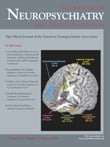Clozapine-Induced Delirium
To the Editor : Clozapine, an atypical antipsychotic, remains the “gold standard” for patients with treatment-resistant schizophrenic symptoms. The hematological, metabolic changes, sedation, and lowering of seizure threshold of clozapine is well known, but the occurrence of clozapine-induced delirium has been less reported.
Case Report
Mr. M is a 44-year-old male with an 18-year history of schizophrenia characterized by somatic delusion, delusion of persecution, and episodes of aggressive behaviors with impaired occupational functioning. He was untreated for 16 years. His medical history was negative. For the past 20 months, he had been reasonably stable on risperidone, 6 mg/day. Following a stressor, he had worsening of psychotic symptoms and had episodes of aggressive behaviors with deteriorating occupational functioning. Risperidone was increased to 9 mg/day, however, he did not show much change in his mental state. Considering his long-term illness and worsening of symptoms in spite of an adequate dose of risperidone, clozapine was considered.
At the time of admission for initiation of clozapine, his baseline, complete blood count, liver function test, and ECG were normal. His vital signs were as follows: BP 120/80, pulse 79 bpm. His neurological examinations were normal. On day one of admission, risperidone was reduced to 6 mg/day and clozapine was initiated with 25 mg/day. On the subsequent days, risperidone was reduced by 2 mg/day and clozapine was increased by 25 mg/day until he reached 100 mg/day. Five days after admission, he was on clozapine, 50 mg in the morning and 75 mg in the night, and his orientation and level of consciousness were stable. On day six with the same dose of clozapine, he became confused, disoriented, and his recent memory was impaired. He was agitated, intermittently answered questions inappropriately, and was unable to follow commands. His vital signs were BP 110/75, pulse 89 bpm; ECG, electrolytes and glucose were normal. His neurological examinations were normal. Clozapine was stopped on day seven and his agitation secondary to delirium was managed with lorazepam and haloperidol injections. Two days after stopping clozapine, his delirium resolved completely. He was started with olanzapine, 5 mg, on day 10 and the dose was gradually increased to 15 mg/day. Two months after starting on olanzapine, Mr. M returned to his work and did not show any signs of delirium, however, continued to harbor delusions.
Comment
Clozapine-induced delirium has been reported to have an incidence between 2.1%–10%. 1 , 2 Many physicians may be unaware of clozapine-induced delirium, in spite of its high incidence as it is less frequently reported in the literature and less attention has been given to this adverse effect. It is hypothesized that delirium is due to cholinergic imbalance caused by clozapine. 3 , 4 It is not known whether delirium is dose dependent; future research has to address the predisposing factors for clozapine induced delirium.
1 . Gaertner HJ, Fischer E, Hoss J: Side effects of clozapine. Psychopharmacology 1989; 99(S):97–100Google Scholar
2 . Centorrino F, Albert MJ, Drago-Ferrante G, et al: Delirium during clozapine treatment: incidence and associated risk factors. Pharmacopsychiatry 2003; 36:156–160Google Scholar
3 . Szymanski S, Jody D, Leipzig R: Anticholinergic delirium caused by retreatment with clozapine [letter]. Am J Psychiatry 1991; 148:1752Google Scholar
4 . Stanilla JK, de Leon J, Simpson GM: Clozapine withdrawal resulting in delirium with psychosis: a report of three cases. J Clin Psychiatry 1997; 58:252–255Google Scholar



